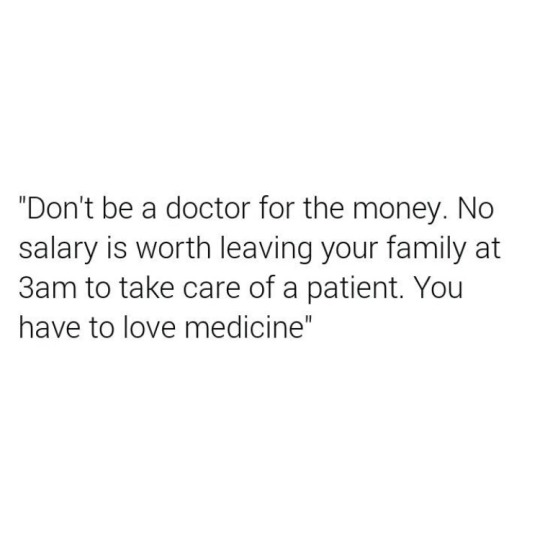Text
Tumblr,
As you’re probably aware, the coronavirus disease, or COVID-19, has now been found in countries all over the globe. This is an understandably disconcerting moment for many, but there are steps we can all take to help mitigate the effect on our communities.
COVID-19 is spreading, but misinformation and disinformation are spreading even faster. The most responsible thing you can do is protect yourself from both the disease and false information. Being prepared with facts and data instead of assumptions and fabrications will help inform how you can best prepare for COVID-19.
Here are some resources you can trust:
WHO provides daily updates surrounding COVID-19’s spread, infection rate, and general influence on our society. Their latest update given on March 3, 2020, details that there is a shortage of personal protective equipment for healthcare professionals. They also provide a very handy FAQ section, where you can learn more about how to protect yourself and your community.
Every day Worldometer updates its website with the number of confirmed COVID-19 cases in each country that has been affected. Worldometer has been rated one of the best free reference websites by the American Library Association, and for good reason: it lists every single one of its regular sources here, and lists the source of every COVID-19 update at the bottom of the COVID-19 page.
Your local health department will often have the most up-to-date information specific to your immediate area, including how to proceed if you believe you may be showing symptoms of the virus. If you live in the United States, you can find the contact information for your health department by visiting the National Association of County and City Health Officials (NACCHO).
There’s another thing about this news that a lot of places are not talking about: the toll on one’s mental health, especially if you are someone who struggles with anxiety. If you find your concerns about being prepared are crossing a line that affects your mental health, please consider reaching out to a loved one who can guide you to help, a mental health professional, or an organization set up to help those in need.
Here are a couple of organizations you can trust:
Crisis Text Line is free, 24/7 support. Just text 741741 from anywhere in the United States. The Crisis Text Line will connect you with a trained Crisis Counselor.
National Alliance on Mental Illness (@namiorg) offers free support and resources for those who are struggling. NAMI can be reached Monday through Friday, 10 am - 6 pm EST at 1-800-950-NAMI (6264) or by email at [email protected].
Take care of yourselves, Tumblr. Wash your hands well, practice keeping a safe distance from others, only wear a mask if you believe you are sick with COVID-19 symptoms and could infect others (or are immunocompromised yourself), and remember to fact check everything that you see. Head on over to @world-wide-what for a refresher on what fake news looks like and how it spreads. Pass those tips onto others when you see them accidentally spreading false information.
<3
69K notes
·
View notes
Text
10 Things I Learned as an Interviewer for the Interviewee
As a fourth year medical students (yikes) I was able to become an interviewer for my medical school. So yes, that means maybe someone I’ve interviewed may one day see this. Though probably not. Anyways, it was very surreal to be on the other side of the process all these years later and while I’m getting ready for interviews myself (anyone want me for residency, btw?)
A lot of expectations and previous notions about interviews that I had really did change and I can see how intricate the process actually is, and I get why we get asked the questions we do. At least somewhat better.
All experiences and interviewers are different but here are some things I think can really help out the interviewee. Maybe things you thought were hard and fast rules but aren’t or things you didn’t expect us to be looking for. Anything to help! And while this is directed at pre-meds, the advice should still general enough that anyone can use it, if they want.
Some things to know beforehand; I was part of a two-on-one interview setting which lasted 30 minutes with a few preset questions we needed to ask. The interview was blind, so we couldn’t see stats.
Take a second to observe your interviewers.
This isn’t an open invitation to judge your interviewers, but most of us are pretty telling in the way we present ourselves. If you can take a break for the nerves for a second pay attention to our introductions, our demeanor and how we’re dressed. It can give you a sense of how relaxed or stringent we may be and what our personalities may be like even if we were told to stay stone cold poker-faced. And always keep in mind who your interviewers are and what departments they’re from. It can help guide the tone we set for the entire interview.
Play off the interviewers.
Now that you’ve taken a moment to take in your surroundings use those to your advantage. If we’re playing tough, answer with strength and intention. If we’re relaxed, don’t sit so stiff and maybe get us to laugh. If you are asked thought provoking questions, take time to think about it and provide thought provoking answers. The more you work with us, the easy and more open a dialog becomes and the more personable the interview will become. It’s a great way to show flexibility and adaptation, and for the interviewers who did this well we found ourselves impressed.
If I’m offering you information, take it.
If I am telling you that I am a 4th year and I can answer your questions about rotations, classes, or student life I am literally giving you questions to ask me in the event you have forgotten all of yours. If faculty tells you which program they are a part of and what they specialize in they are opening that line of information for you. They are telling you were their interests and focuses are and you can run with that, if you like.
Please, please do your research.
We had an application who couldn’t tell us what they liked our school. Had no idea what the mission statement was or what the goals of the school were. Didn’t have a clue. I had to use my doctor face so I could stay neutral. It was bad. I get that you just want to be in medical school but come on. Point blank, there is no excuse for anyone to know nothing about the program they’re interviewing for. You should also have worked out answers for frequently asked questions. Getting stumped on classic medical school questions…it’s a big red flag. So please plan ahead and do your research.
Pick the length of your answers carefully.
Different types of questions prompt different types of answers. There are a lot of questions that can prompt follow up questions. Hobbies for example; going into every detail about your hobbies is probably counterproductive. But that’s assuming you have a fair amount of things you like to do that aren’t medicine. You can add a snip here and there, like “I’ve done that for 15 years” or “it’s really a huge passion of mine” but if there is interest in hearing more, we’ll most likely ask. If you only have one thing, don’t think “I like running” is a good enough answer. Give us something to work with. There are questions, especially theoretical ones or tell me a story situations that are meant to be longer. And always keep in mind your time limit.
Be confident, not cocky.
There is a huge difference between smug and confident. We had one prospect who gave this shit-eating “gotcha” grin after every question they thought they had aced. It was almost like they were trying to directly challenging me. It got to the point that I stopped caring what they were saying and was just getting pissed. The answers could have been great (they weren’t) but all that stuck with me was the cockiness. Not sure if you do that unintentionally? That’s what practice interviews are for. There are very clear differences when someone was proud of an answer and were pleased, and what this individual was doing. And if you do act that way, personally, I don’t want you representing my school, regardless of what your application looks like.
I don’t care about the “right” answer. I care why.
I know there are certain questions answers that are kind of set in stone. And I know straying too far from say, an ethics question, is hard to do in a new and unique way. The way to make yourself stand out from the crowd is to explain the reasons why you believe this to be the “right” answers since those tend to differ among applicants and shows your critical thinking skills past “well obviously this is the right answer”. Aside from that most interviewers don’t have specific expectations for most questions. We’d rather just hear about you and your personal experiences, honestly.
We’re not always looking for your spoken answer.
Sometimes we’re looking at your body language. I will purposefully ask questions I know there are only a few answers too. Not because I want to know if you know it, but rather how you viscerally respond. Do you look uncomfortable when answering an ethics or grades question? Did you answer robotically? Are you still looking at me? Can you pick yourself back up after a rough question? What you do speaks just as loud as the things your saying and I’m looking for it.
Use your personality and responses to show you want to be here. Not your grades.
This was not an isolated event. I had a few prospective students speak about a class and sneak in “which I got an A in” and continue. Not really a fan of that. I naturally assume that everyone we interviewed had good enough grades and scores because, well, you’re at the interview. At this point in the process all I want if for you to shine beyond those things and prove to me that you can be a doctor on paper and in person.
Make me feel connected to you.
In the end, I want to feel like I know who you are. I want to know what you stand for and I want to experience the person who wants to become a physician. I want to appreciate your story and how far you’ve come. We don’t need to become best friends, we don’t need to have similar thoughts or values or personalities. But I want to feel like we could understand each other now and in the future. Let me be excited about you and for you. Let me want you to be here so I can check accept.
I hope someone was able to get something useful from this because for all of you here dying to enter this crazy profession I want you to reach your goals. I really do, and I’m just doing all I can on the internet. Good luck to everyone on your interviews!
2K notes
·
View notes
Photo
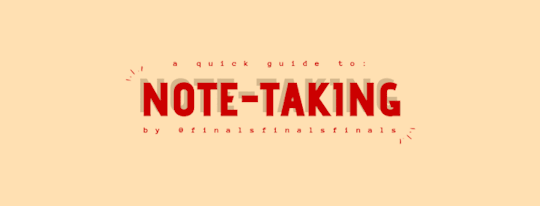
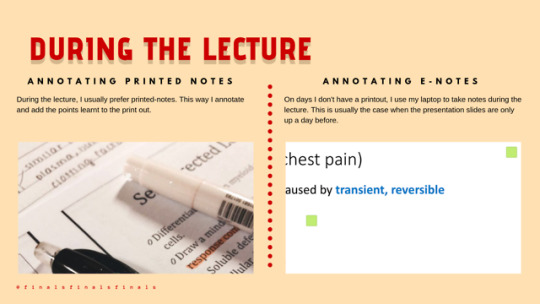
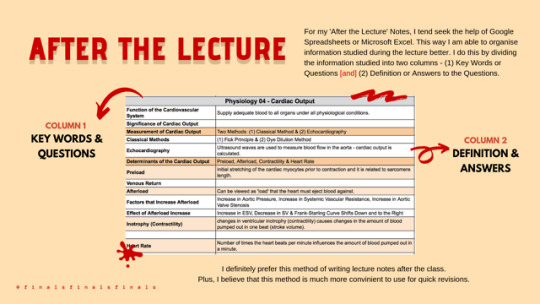
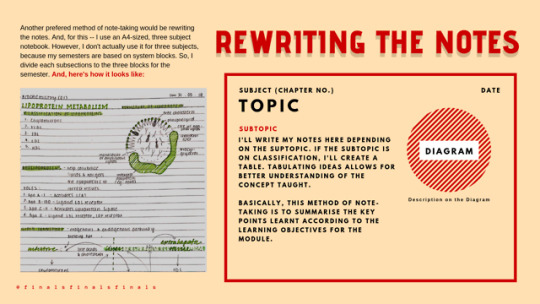
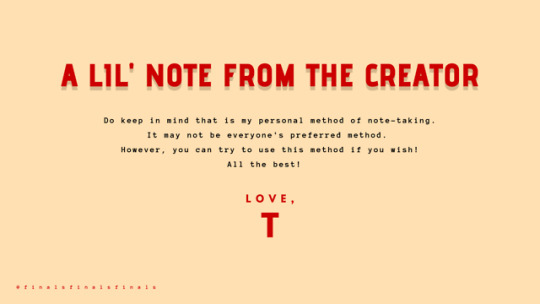
I’ve been receiving tonnes of questions on Note - Taking recently, so I’d thought I make a post. Plus, I had fun making these graphics.
There are three different methods that I prefer when it comes to note taking:
Notes written During the Lecture
I highly recommend taking notes during the lecture.
I also use abbreviations for quicker and more efficient note taking. Some examples of abbreviation that I use are:
w/ - With
w/o - Without
e.g. - For example
Notes written After the Lecture
As for notes written after the lecture, I tend to seek the help of Google Spreadsheets or Microsoft Excel. This way I am able to organise information learnt. I do this by dividing the information provided into two columns, one for keywords or questions and the other for definitions and answers.
*Note: This method was adapted from the note taking method I’ve used during college.
Rewritten Notes
I also rewrite my notes. My rewritten notes are arranged based on the order they appear in the syllabus unless there are pieces of information that are related to more than one topic.
I use a black pen or pencil for my written notes, as well as coloured pens and highlighters to highlight the key words and terminologies for emphasise.
Before writing them down, I tend to visualise the layout - alternating between words and pictures/diagram. This definitely helps me with remembering for exams. All I have to do is imagine that I’m looking at that page and I can remember where everything is.
______________________________________________________________________
Please click on the images for a much clearer view.
Well, that’s all from me! I hope that you found this information helpful. And, don’t hesitate to ask me questions if you’re confused about this method of note-taking, or any other problems you might have. For more information of how to survive university, follow this page. And, for more medical school chronicles, follow me on IG. Follow my studygram/medgram for more content.
4K notes
·
View notes
Text
My boyfriend has invented a new game called “diagnosis” to help me revise for my exams
He isn’t a medic so he has to learn about a disease and then pretends to be my patient and I diagnose him - we do it over facebook messenger (we are long distance)
It’s probably the most thoughtful thing anyone has ever done for me to help me revise I’m so in love.


I love this so much <3
4K notes
·
View notes
Text
A GUIDE FOR EVERY STUDENT: HOW TO STUDY SMARTER AND NOT HARDER!
A lot of us have difficulty when it comes to learning all types of new information. Especially when we’ve got other priorities to worry about. After much experimentation, I’ve found that the following tips helped me make the most of my time and also helped me plan much more fruitful study sessions!
- Designated Study Area.
A coffee shop, the library, a desk, or even your bed. Figure out where you are most comfortable studying - The right location provides comfort, no distractions and is quiet. Another factor to consider is timing. Are you a morning person, an evening person or a night person? Combine the time with the location and there’s your study area!
- The Key to Success is Time Management.
Plan your time using a simple schedule template, or make a simple to-do-list. The trick is to complete short tasks in a reasonable amount of time; like going over 5 pages of a textbook in approimately 15 minutes. Keeping a written schedule keeps you in line, and this way you won’t forget the tasks you need to complete for the day!
- Note Taking.
Personally, I like to keep a hardcopy of the days lecture and just scribble down any information that I think is important. BUT, there are some pretty cool note-taking strategies out there that you can utilise. Check out The Cornell Method, Mind Mapping, and the Split Page Method. Active learning produces more results than passive learning - so write down those notes and stay active!
- Meet the Syllabus.
The syllabus outlines the most important learning outcomes/ learning goals, and thats pretty much all you need to plan a productive studying session.
Bid farewell to all that extra, unnecessary information.
- What is your learning style?
Are you a visual, auditory, verbal or kinesthetic learner? Experiment with all 3 and find out which one works best for you. You don’t necessarily need to stick with one! Do you study better alone or do you prefer group study?
- Bite-sized Learning.
Do not try to cram in a huge amount of information all at once. Instead, try breaking information down into learnable, manageable chunks. Combining this method with tip #2 will help you make the most of your time.
- Review, Review, Review!
It’s scientifically proven that the more you review material, the easier it’ll be for you to recall it when needed. So, take another look at your notes a couple of days after you make them, then again a week later, and so on.
These are the main tips I’ve found to be of help, and I hope they’re of use to everyone else!
5K notes
·
View notes
Photo

The first American woman to go to medical school was admitted as a joke. When Elizabeth Blackwell applied to Geneva Medical School in 1847, the students thought it was a prank- so all 150 of them voted her in. She graduated in 2 years, co-established and taught at a London women’s school, opened an infirmary for the poor, and started her own practice. Source
9K notes
·
View notes
Photo
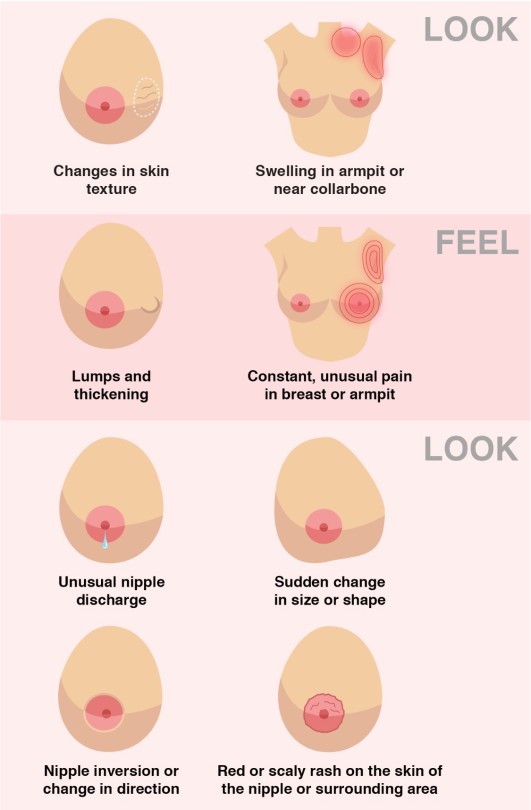
How to spot signs and symptoms of Breast Cancer
391K notes
·
View notes
Text
reminder to:
straighten your back
go pee goddAMN IT STOP HOLDING IT
go take your meds if you need to
drink some water
go get a snack if you havent eaten in a while
maybe wander around the house/stretch a little if you’ve been sat at the computer a while (artists especially: sTRETCH THOSE WRISTS)
reply to that text/message from earlier you’d forgotten about
maybe send a nice lil message to someone having a bad day?
1M notes
·
View notes
Text


If there was a way to run SUPER MEGA AD BLOCKER on this website I fucking would
418K notes
·
View notes
Text
GEM (Graduate Entry Medicine) in the UK
Dear applicant,
I will be embarking on my new GEM journey this upcoming September and thought I’ll share the little bits and pieces I learnt during the application process.
1. Applying for Graduate Entry Medicine is no easy feat. It requires a good amount of preparation and making sure that you tick all requirements (EVERY. SINGLE. ONE from work experience to A-levels if need be).
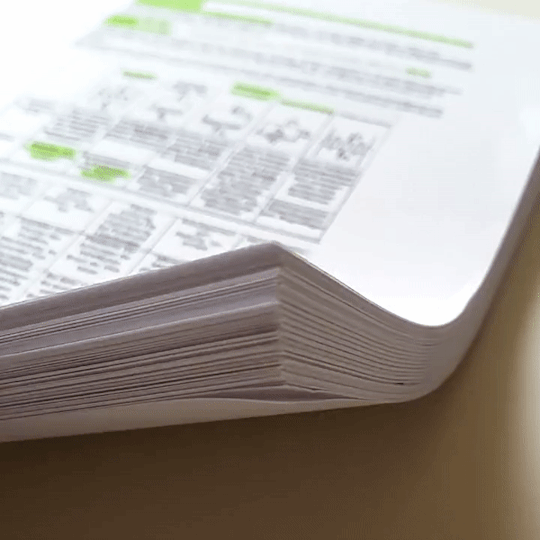
2. Do your research. Check which universities give you a higher ratio of getting in. Choose wisely.

3. Prep yourself to the max. Decide UKCAT/GAMSAT and intensely prep yourself for at least 2 months. Remember to work smartly and pace yourself.

4. If you fit every single criteria - the chances of getting an interview are very high. Now start reading around and getting your head around healthcare news (from NHS to specific cases).

5. If all above goes well - there’s no reason you can’t be well on your way to med school. Good luck (and do keep an eye out for further detailed posts!)

0 notes
Text
Women are more likely to die following a heart attack - why?
Largely due to different types of heart attack causing different symptoms. In women, a more ‘subtle’ heart attack is more common.

7K notes
·
View notes
Text
FREE MEDICAL PDFs
Anatomy:
1–> KLM for Gross Anatomy
2–> Snell’s Anatomy
3–> BD Churassia
4–> RJ Last
5–> Grey’s Anatomy
6–> Langman Embryology
7–> KLM for Embryology
8–> BD For General Anatomy
9–> Dissector
10–> Di Fore Histology
11–> Junqueira’s Histology
12–> Netter Atlas of human Aantomy
Folder link–> https://drive.google.com/open?id=0B3WdpdsqpX0LYV9KQ3lxY29FY28
Physiology:
1–> Guyton
2–> Ganong
3–> Sheerwood
4–> Sembulingam
Folder link–> https://drive.google.com/open?id=0B3WdpdsqpX0LdXlCSjdZM214dEE
Biochemistry:
1–> Harper
2–> Lippincott
3–> Chatterjea
4–> Satyanarayan
5–> Stryer
6–> MRS Biochemistry
Folder link–> https://drive.google.com/open?id=0B3WdpdsqpX0Ld0o3WnhCR2VEczg
Pathology:
1–> Big Robins
2–> Medium Robins
3–> Pathoma
4–> Goljan
5–> Harsh Mohan Pathology
6–> Atlas of Histopathology
7–> Levinson
8–> MRS microbiology
9–> Microbiology by Jacquelyn G. Black
10–> Color Atlas of Microbiology
11–> Kaplan Pathology
Folder link–> https://drive.google.com/open?id=0B3WdpdsqpX0LYkRYdjFrTm5MR0U
Pharmacology:
1–> Big Katzung
2–> Mini Katzung
3–> Kaplan Review
4–> Lippincott
5–> Pocket Katzung
6–> Rang and Dale’s Pharmacology
7–> Atlas of Pharmacology
Folder link–> https://drive.google.com/open?id=0B3WdpdsqpX0LMkE1UUVRZGwtTlU
Forensic Medicine:
1–> Simpson’s Forensics
2–> Krishan’s Forensics
3–> Atlas of Autopsy
4–> Atlas of Forensic Medicine
Folder link–> https://drive.google.com/open?id=0B3WdpdsqpX0LQXVwOGoyWnFSV2s
Ophthalmology:
1–> Jogi
2–> Jatoi
3–> Parson’s Textbook of Eye
4–> Kanski
5–> AK Khurana
6–> Atlas of ophthalmology
Folder link–> https://drive.google.com/open?id=0B3WdpdsqpX0LOHc5WVZMdkJjX2M
Otorhinolaryngology:
1–> Dhingra
2–> Logans Turner
3–> Color Atlas of Otorhinolaryngology
4–> Maqbool’s Text Book of ENT
5–> Clinical Methods in ENT by PT Wakode
6–> ENT at a Glance
Folder link–> https://drive.google.com/open?id=0B3WdpdsqpX0LaDY2a0lFNDlfTGc
Community Medicine:
1–> Monica’s Text Book Community Medicine
2–> Mahajan And Gupta Text Book of Community Medicine
3–> Bancroft’s Text Book of Community Medicine
Folder link–> https://drive.google.com/open?id=0B3WdpdsqpX0Lc1RCMml2NjhFNjA
Internal Medicine:
1–> Churchill’s Pocketbook of DD
2–> MTB Step 2 Ck
3–> Davidson Essentials
4–> Davidson Principals and practice
5–> Harrison’s Internal Medicine
6–> Internal Medicine USMLE Nuggets
7–> Internal Medicine on call bt LANGE 8–> Oxfords Specialties
Folder link–>https://drive.google.com/open?id=0B3WdpdsqpX0LeEFJNG5TMlc4eWc
Surgery:
1–> Bailey_love short practice of Surgery
2–> Churchill’s pocketbook of Surgery
3–> Deja Review of surgery
4–> Farquharson’s Textbook of Operative General Surgery
5–> Hamilton Bailey’s Physical Signs
6–> Oxford Handbook of Clinical Surgery
7–> Schwartz’s Principles of Surgery
8–> Macleod’s Clinical Examination
9–> Macleod’s Clinical Diagnosis
Folder link–>https://drive.google.com/open?id=0B3WdpdsqpX0LRFpFSG5hZ1pVWkE
Obstetrics & Gynecology:
1–> Case Discussions in Obstetrics and Gynecology
2–> Deja Review of Obstetrics Gynecology
3–> Obstetrics by Ten Teachers
4–> Gynaecology illustrated
5–> Gynaecology by Ten Teachers
Folder link–>https://drive.google.com/open?id=0B3WdpdsqpX0LMU1LRjFDa1FrbjA
Pediatrics:
1–> Nelson Essentials of Pediatrics
2–> Nelson Complete
3–> Pediatrics Review
Folder link–>https://drive.google.com/open?id=0B3WdpdsqpX0LUkdTQkVuNV92Yzg
I hope this helps everyone, it’s not mine. But has been shared to me and I am sharing this with all of you.
11K notes
·
View notes

